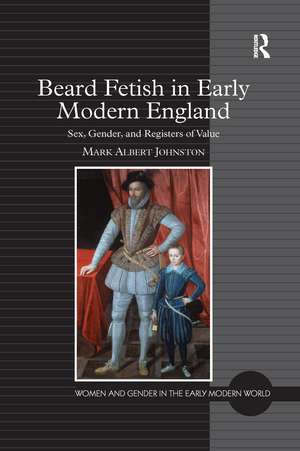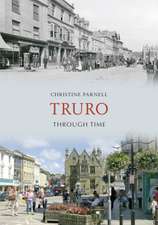Beard Fetish in Early Modern England: Sex, Gender, and Registers of Value
Autor Mark Albert Johnstonen Limba Engleză Paperback – 30 noi 2016
| Toate formatele și edițiile | Preț | Express |
|---|---|---|
| Paperback (1) | 312.43 lei 6-8 săpt. | |
| Taylor & Francis – 30 noi 2016 | 312.43 lei 6-8 săpt. | |
| Hardback (1) | 821.94 lei 6-8 săpt. | |
| Taylor & Francis – 28 sep 2011 | 821.94 lei 6-8 săpt. |
Preț: 312.43 lei
Preț vechi: 356.64 lei
-12% Nou
Puncte Express: 469
Preț estimativ în valută:
59.79€ • 63.93$ • 49.85£
59.79€ • 63.93$ • 49.85£
Carte tipărită la comandă
Livrare economică 18 aprilie-02 mai
Preluare comenzi: 021 569.72.76
Specificații
ISBN-13: 9781138254473
ISBN-10: 1138254479
Pagini: 312
Dimensiuni: 156 x 234 mm
Greutate: 0.45 kg
Ediția:1
Editura: Taylor & Francis
Colecția Routledge
Locul publicării:Oxford, United Kingdom
ISBN-10: 1138254479
Pagini: 312
Dimensiuni: 156 x 234 mm
Greutate: 0.45 kg
Ediția:1
Editura: Taylor & Francis
Colecția Routledge
Locul publicării:Oxford, United Kingdom
Notă biografică
Mark Albert Johnston is an Associate Professor in the English Department at the University of Windsor, where he teaches courses on Early British Literature, Shakespeare, and Drama.
Recenzii
"Mark Johnston’s exploration of the beard as a fetish object is a valuable contribution to the growing literature on the gender implications of the adornment and embellishment of the body in early modern English culture...the work is particularly valuable for its depictions of beards in English literature, and it contributes to our understanding of the cultural production of meaning, the complex and contradictory meanings of the fetish object, and the associated implications for gender, sex, and power in early modern England." --Judith Bonzol, The University of Sydney, Parergon
"Providing new insights into familiar texts and detailed readings of lesser known English plays, Beard Fetish in Early Modern England is full of fascinating material. Mark Johnston incisively describes the many registers of cultural difference that signified through the beard, and he productively combines historical and theoretical analysis of the fetish." --Mario DiGangi, Lehman College and the Graduate Center, CUNY; author of The Homoerotics of Early Modern Drama
"This book makes a significant and important contribution to studies of fetishism, masculinity, embodiment, early modern drama, ideology critique, and Lacanian theory... Its thorough documentation of the extent to which masculinity and beardedness were fused in the late sixteenth and early seventeenth century is a vital contribution to an embodied historicism." --Renaissance and Reformation
"Beard Fetish is a clever and impressive piece of writing... There are long and full interrogations of passages from Shakespeare, Jonson, Lyly, Skelton, Udall, and many others: Johnston is very accomplished at reading these excerpts for their relevance to social attitudes toward not only beards, but sex, gender, and power as well. The book has many strengths that will surely make it popular with academic readers interested in these issues." --Renaissance Quarterly
"Johnston's admirably scholarly and wide-ranging study examines the variety of ways in which beards (or their absence) were invested with cultural and psychological meaning in the early modern period. Drawing on Marxism, psychoanalysis, anthropology and deconstruction, Johnston illuminates how the gender-power hierarchy is troubled and maintained, examining the role fetish plays in naturalizing aspects of an individual's gender and cultural identity… Beard Fetish in Early Modern England is impressively researched and intelligently argued, full of interesting historical detail and sensitive literary readings; it will challenge some received ideas and offer readers new insight into the early modern performance of masculinity and its fraught relationship with cultural ideals of male mastery." --Renaissance Studies
"There were other kinds of fetishism, too, as Mark Albert Johnston’s remarkable first monograph … makes admirably clear. Johnston’s main concern is with the fetish rather than the beard, although facial horticulture certainly provides an illuminating synecdoche for wider cultural tendencies…. By obtruding a sign of personal identity beyond the physical body of the person, the beard visibly overran the boundary between subject and object. Where does the self end and the world begin? Modernity would demand new answers to that question, and those answers were formulated using the kind of symbols, figures, and tropes that Johnston explicates with consummate skill. The beard emerges from this fascinating study as a floating signifier, sometimes stimulating lengthy hermeneutic expositions on its multifarious meanings, at other times, as in Shakespeare’s Macbeth, violating nature." --SEL Studies in English Literature 1500 – 1900
"This study once more proves that topics which may seem somewhat eccentric at first glance are often liable to be rewarding subjects of academic study, capable of reforming our knowledge and thinking about early modern culture…. Johnston is very much interested in theories of the fetish and the fetish’s unstable and self-subverting processes of signification, and he mines a large number of canonical and non-canonical texts [unearthing] a multitude of meanings and cultural practices around these material objects that often, but by no means always, functioned as markers of prosthetic masculinities." --Shakespeare Jahrbuch
"This book takes the subject and gives it its own thorough treatment in one volume. Johnston…successfully depicts the misogynist hysteria of the period in its most uncanny variations." --Sixteenth Century Journal
"Providing new insights into familiar texts and detailed readings of lesser known English plays, Beard Fetish in Early Modern England is full of fascinating material. Mark Johnston incisively describes the many registers of cultural difference that signified through the beard, and he productively combines historical and theoretical analysis of the fetish." --Mario DiGangi, Lehman College and the Graduate Center, CUNY; author of The Homoerotics of Early Modern Drama
"This book makes a significant and important contribution to studies of fetishism, masculinity, embodiment, early modern drama, ideology critique, and Lacanian theory... Its thorough documentation of the extent to which masculinity and beardedness were fused in the late sixteenth and early seventeenth century is a vital contribution to an embodied historicism." --Renaissance and Reformation
"Beard Fetish is a clever and impressive piece of writing... There are long and full interrogations of passages from Shakespeare, Jonson, Lyly, Skelton, Udall, and many others: Johnston is very accomplished at reading these excerpts for their relevance to social attitudes toward not only beards, but sex, gender, and power as well. The book has many strengths that will surely make it popular with academic readers interested in these issues." --Renaissance Quarterly
"Johnston's admirably scholarly and wide-ranging study examines the variety of ways in which beards (or their absence) were invested with cultural and psychological meaning in the early modern period. Drawing on Marxism, psychoanalysis, anthropology and deconstruction, Johnston illuminates how the gender-power hierarchy is troubled and maintained, examining the role fetish plays in naturalizing aspects of an individual's gender and cultural identity… Beard Fetish in Early Modern England is impressively researched and intelligently argued, full of interesting historical detail and sensitive literary readings; it will challenge some received ideas and offer readers new insight into the early modern performance of masculinity and its fraught relationship with cultural ideals of male mastery." --Renaissance Studies
"There were other kinds of fetishism, too, as Mark Albert Johnston’s remarkable first monograph … makes admirably clear. Johnston’s main concern is with the fetish rather than the beard, although facial horticulture certainly provides an illuminating synecdoche for wider cultural tendencies…. By obtruding a sign of personal identity beyond the physical body of the person, the beard visibly overran the boundary between subject and object. Where does the self end and the world begin? Modernity would demand new answers to that question, and those answers were formulated using the kind of symbols, figures, and tropes that Johnston explicates with consummate skill. The beard emerges from this fascinating study as a floating signifier, sometimes stimulating lengthy hermeneutic expositions on its multifarious meanings, at other times, as in Shakespeare’s Macbeth, violating nature." --SEL Studies in English Literature 1500 – 1900
"This study once more proves that topics which may seem somewhat eccentric at first glance are often liable to be rewarding subjects of academic study, capable of reforming our knowledge and thinking about early modern culture…. Johnston is very much interested in theories of the fetish and the fetish’s unstable and self-subverting processes of signification, and he mines a large number of canonical and non-canonical texts [unearthing] a multitude of meanings and cultural practices around these material objects that often, but by no means always, functioned as markers of prosthetic masculinities." --Shakespeare Jahrbuch
"This book takes the subject and gives it its own thorough treatment in one volume. Johnston…successfully depicts the misogynist hysteria of the period in its most uncanny variations." --Sixteenth Century Journal
Cuprins
Introduction; 1: Fetish and Value; 2: Beard Value and Manhood; 3: The Functional Value of Beardless Boys; 4: Re-evaluating Bearded Women; 5: Devaluing the Beard: Half Beards and Hermaphrodites; Epilogue: Transcending Value
Descriere
Beard Fetish in Early Modern England: Sex, Gender, and Registers of Value uniquely focuses on representations of facial hair for early modern culture and analyzes the role fetish plays in naturalizing categories like sex and gender. Author Johnston explores how beards in all their variety-including beardlessness and female beards-are freighted with cultural and psychic significance, materializing complex and contradictory value in multiple registers.




